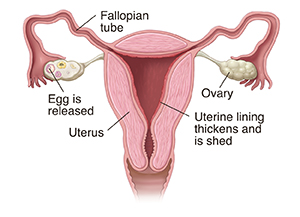Having a period (menstruation) is a normal part of growing up for girls. It can be a confusing and even embarrassing topic for girls and their parents to discuss. But it doesn’t have to be. These are the basic facts about periods. It also helps answer common questions a girl might have and get the conversation started.
Normal menstruation
Periods are part of the body’s way to prepare for having a baby. Menstruation happens once a month. The menstrual cycle takes about 28 days from start to finish (though it can be longer or shorter).
-
Once a month, blood and nutrients build up in the lining of a woman’s uterus (womb).
-
At the same time, an egg is released from 1 of the 2 ovaries (where eggs are stored). The egg travels through a fallopian tube from the ovary to the uterus.
-
If the egg meets a man’s sperm (reproductive cells sent into the woman’s vagina during sex), the egg is fertilized. The fertilized egg implants in the lining of the uterus. The woman is then pregnant.
-
If the egg is not fertilized, the lining of the uterus is shed out of the woman’s body through the vagina. This is a period.
When will I start having periods?
Girls usually start having periods between the ages of 8 and 15. The average age that girls start menstruating is 12 years. But starting periods earlier or later than this is also normal.
How often will I get my period?
During the first 2 years after a girl starts menstruating, it is very common for periods to be irregular. This means you won’t know when to expect them. After a few years, when periods become regular, they usually happen every 3 to 5 weeks.
How long do periods last?
Periods typically last for 3 to 7 days. But they can be shorter or longer than this, especially at first.
What color, thickness, and amount of blood is normal?
The menstrual flow can be brown, pink, or red. It can be thick, lumpy, or runny. It is common for periods to be heavier at the start. They then get lighter over the days of the period.
Are cramps normal? What can be done about them?
Girls often have pain or cramping right before their periods and during periods. Cramps happen because muscles in the uterus are tightening to help shed the lining. Cramps tend to last for 2 to 3 days. Period cramps can be very painful. They are a common reason why teen girls miss school. But the pain can be treated. An adult dose of ibuprofen or naproxen can help. Check the bottle label for the right dosage. A warm bath, a hot water bottle held on the abdomen, and gentle stretching can also help relieve pain from cramps. And getting regular exercise throughout the month has been shown to help ease menstrual cramps.
Are pads or tampons better? Will using tampons cause me to lose my virginity?
Pads are a good choice for a girl when she first starts getting her period. They are easy to use and change. But there’s no reason a girl can’t learn to use a tampon. Using a tampon will not cause a girl to lose her virginity. The thin skin (the hymen) that surrounds the opening of the vagina can break for many reasons, including putting in a tampon. But a broken hymen doesn’t mean a girl is no longer a virgin. Note that tampons must be changed regularly, according to the package directions. If a girl rarely changes tampons or forgets to remove a tampon at the end of her period, she can get a serious infection. Because periods can be irregular and start unexpectedly, it's helpful to always have pads or tampons available.
What is PMS?
PMS is short for premenstrual syndrome. PMS is a group of symptoms that can happen right before a period. These symptoms include headaches, mood swings, irritability, muscle aches, food cravings, tiredness, bloating, and sore breasts. If PMS symptoms are very bad, tell a healthcare provider. There are things that can be done to help.
Talking to teens about sex
It is essential to discuss sex and sexual activity with your teenager. Let her know your thoughts and feelings and how to keep herself safe before she starts having sex. If you’re uncomfortable talking about these issues, have a healthcare provider help you get the conversation started.
When to call the healthcare provider
The following signs or symptoms may mean a problem. Call a healthcare provider if your child:
-
Saturates more than a pad in an hour
-
Has cramps that are severe or last for longer than 3 days
-
Has periods that typically last for longer than 8 days
-
Has a cycle that doesn’t become regular (meaning periods every 3 to 5 weeks) after 2 years
-
Bleeds more heavily than before, or bleeds between periods
-
Starts to have periods, then stops having them for months
Featured in


